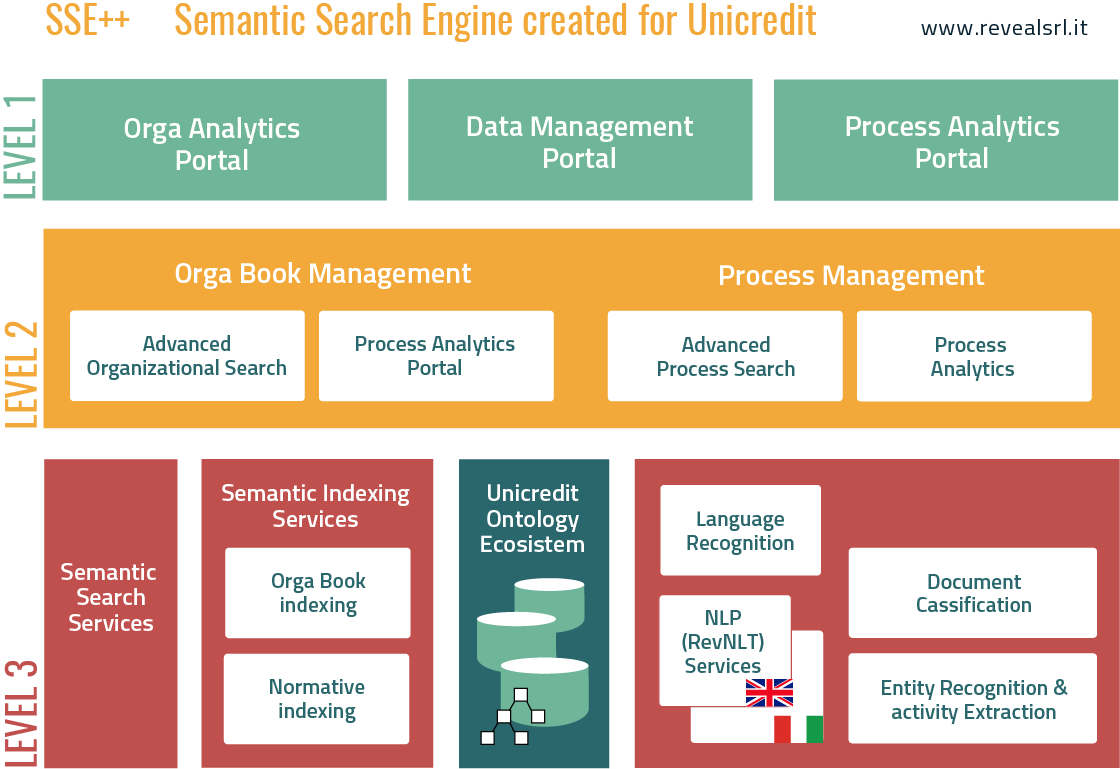Semantic Search Engine – SSE++
Analytics for Bank Organisation
SSE++ provides the possibility to associate internal documentation with ontological structures that define and regulate the processes in force in the bank organization. In addition, SSE++ allows the automatic recognition of semantic relationships between process documents, organizational texts and standards in use in UniCredit’s organization. This enables navigation between documents through interactive graphs, expressing the conceptual links between working groups, processes and standards.
Technological Objective: Information Extraction through Text Understanding, Semantic Search and Intelligent Document Browsing in the banking domain
Reference User: UniCredit
Project timeline: April-December 2014, June-October2015, May-December 2016

Semantic Search Engine for Unicredit
Semantic Search Engine (SSE++) is the intelligent platform created for UniCredit in partnership with its internal division “Organization & Logistics”.
The aim of the project was to design and develop a service-based architecture based on Data and Text Mining technologies, Information Extraction and Semantic Search applied to the:
- Organizational Documentation
- Normative Documentation
- Process Architecture Documentation
SSE++ provides the possibility to associate internal documentation with ontological structures that define and regulate the processes in force in the organization. In addition, SSE++ allows the automatic recognition of semantic relationships between process documents, organizational texts and standards in use in UniCredit’s organization. This enables navigation between documents through interactive graphs, expressing the conceptual links between working groups, processes and standards.
Advanced Search Services Profiled Oriented
The SSE++ system platform orchestrates several advanced services dedicated to specific intelligent functions
At the first layer we have the Publishing level, i.e. three portals oriented to the consultation needs of three different professional profiles:
- SSE++ for Organizational Analytics dedicated to the organizational analyst interested in navigating information starting from the Group’s organizational structure, oriented towards studying the function of activities (processes and roles) in the governance of responsibilities and human resources.
- SSE++ for Process Management dedicated to the process analyst whose use of the entire documentation focuses on the specification and monitoring of the bank’s processes, from their formalization to their impact on current regulations and on the organizational structures involved.
- SSE+ Data Management Portal dedicated to the system administrator for management and monitoring of the quality of information involved in normative and organizational updates.
The second level of abstraction corresponds to functionalities activated by the consultation needs available in the three portals above:
- Advanced Organizational Search for search and management of Organizational Units, Committees and related links
- Mission Analysis Function for the analysis and retrieval of the activities expressed within the missions of the organizational units listed in the Company Rules and Regulations
- Advanced Process Search for process-oriented analysis
- Process Management Analytics for the automatic classification of regulations in relation to organizational processes.
A set of Text Semantic Processing Services
The basis for the advanced features described here is a set of text semantic processing services that constitute the proprietary core of Reveal’s technology
- Semantic Search Services, the set of tools enabling a semantic content search
- Semantic Indexing Services, the set of tools for document indexing, essential for content search. Divided, according to the nature of the documents, into two processes:
- Normative Indexing for the indexing of normative documents and processes.
- Orga Book Indexing for the indexing of Organizational Units, normative documents and processes.
- UniCredit Ontology Ecosystem, the set of ontological resources required for the operation of the system.
- Language analysis tools, the set of enabling linguistic analysis tools:
- Language Recognition system of automatic language detection.
- RevNLT text syntactic analysts tool, both in Italian and English.
- Document Classification tools for the classification of text content.
- Entity Recognition & Activity Extraction tools for the analysis and extraction of Entities (UOG) and Activities in texts.


